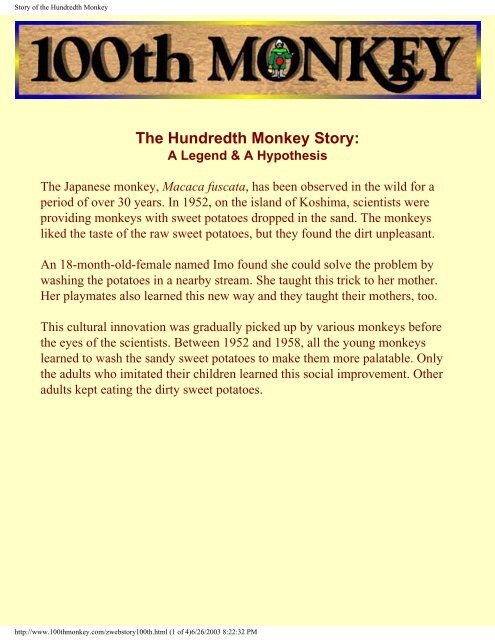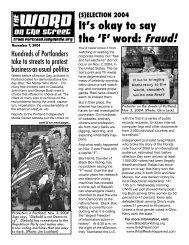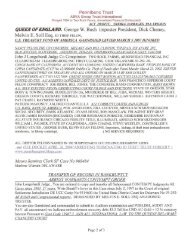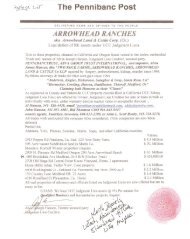Story of the Hundredth Monkey
Story of the Hundredth Monkey
Story of the Hundredth Monkey
You also want an ePaper? Increase the reach of your titles
YUMPU automatically turns print PDFs into web optimized ePapers that Google loves.
<strong>Story</strong> <strong>of</strong> <strong>the</strong> <strong>Hundredth</strong> <strong>Monkey</strong><br />
The <strong>Hundredth</strong> <strong>Monkey</strong> <strong>Story</strong>:<br />
A Legend & A Hypo<strong>the</strong>sis<br />
The Japanese monkey, Macaca fuscata, has been observed in <strong>the</strong> wild for a<br />
period <strong>of</strong> over 30 years. In 1952, on <strong>the</strong> island <strong>of</strong> Koshima, scientists were<br />
providing monkeys with sweet potatoes dropped in <strong>the</strong> sand. The monkeys<br />
liked <strong>the</strong> taste <strong>of</strong> <strong>the</strong> raw sweet potatoes, but <strong>the</strong>y found <strong>the</strong> dirt unpleasant.<br />
An 18-month-old-female named Imo found she could solve <strong>the</strong> problem by<br />
washing <strong>the</strong> potatoes in a nearby stream. She taught this trick to her mo<strong>the</strong>r.<br />
Her playmates also learned this new way and <strong>the</strong>y taught <strong>the</strong>ir mo<strong>the</strong>rs, too.<br />
This cultural innovation was gradually picked up by various monkeys before<br />
<strong>the</strong> eyes <strong>of</strong> <strong>the</strong> scientists. Between 1952 and 1958, all <strong>the</strong> young monkeys<br />
learned to wash <strong>the</strong> sandy sweet potatoes to make <strong>the</strong>m more palatable. Only<br />
<strong>the</strong> adults who imitated <strong>the</strong>ir children learned this social improvement. O<strong>the</strong>r<br />
adults kept eating <strong>the</strong> dirty sweet potatoes.<br />
http://www.100thmonkey.com/zwebstory100th.html (1 <strong>of</strong> 4)6/26/2003 8:22:32 PM
<strong>Story</strong> <strong>of</strong> <strong>the</strong> <strong>Hundredth</strong> <strong>Monkey</strong><br />
Then<br />
something<br />
startling took<br />
place. In <strong>the</strong><br />
autumn <strong>of</strong><br />
1958, a<br />
certain<br />
number <strong>of</strong><br />
Koshima<br />
monkeys<br />
were washing<br />
sweet<br />
potatoes- <strong>the</strong><br />
exact number<br />
is not known.<br />
Let us<br />
suppose that<br />
when <strong>the</strong> sun<br />
rose one<br />
morning <strong>the</strong>re were 99 monkeys on Koshima Island who had learned to wash<br />
<strong>the</strong>ir sweet potatoes. Let's fur<strong>the</strong>r suppose that later that morning, <strong>the</strong><br />
hundredth monkey learned to wash potatoes.<br />
Then it happened!<br />
By that evening almost everyone in <strong>the</strong> tribe was washing sweet potatoes<br />
before eating <strong>the</strong>m. The added energy <strong>of</strong> this hundredth monkey somehow<br />
created an ideological breakthrough!<br />
But notice.<br />
A most surprising thing observed by <strong>the</strong>se scientists was that <strong>the</strong> habit <strong>of</strong><br />
washing sweet potatoes <strong>the</strong>n jumped over <strong>the</strong> sea-<br />
Colonies <strong>of</strong> monkeys on o<strong>the</strong>r islands and <strong>the</strong> mainland troops <strong>of</strong> monkeys at<br />
http://www.100thmonkey.com/zwebstory100th.html (2 <strong>of</strong> 4)6/26/2003 8:22:32 PM
<strong>Story</strong> <strong>of</strong> <strong>the</strong> <strong>Hundredth</strong> <strong>Monkey</strong><br />
Takasakiyama began washing <strong>the</strong>ir sweet potatoes!<br />
Thus, when a certain critical number achieves an awareness, this new<br />
awareness may be communicated from mind to mind.<br />
Although <strong>the</strong> exact number may vary, <strong>the</strong> <strong>Hundredth</strong> <strong>Monkey</strong> Phenomenon<br />
means that when only a limited number <strong>of</strong> people know <strong>of</strong> a new way, it may<br />
remain <strong>the</strong> consciousness property <strong>of</strong> <strong>the</strong>se people. But <strong>the</strong>re is a point at<br />
which if only one more person tunes-in to a new awareness, a field is<br />
streng<strong>the</strong>ned so that this awareness is picked up by almost everyone!<br />
- excerpt from The <strong>Hundredth</strong> <strong>Monkey</strong> by Ken Keyes Jr.<br />
sources for <strong>the</strong> <strong>Story</strong> as acknowledged by him:<br />
Marilyn Ferguson, author <strong>of</strong> The Aquarian Conspiracy (1980)<br />
Carl Rogers, author <strong>of</strong> On Becoming A Person (1961)<br />
Lyall Watson, author <strong>of</strong> Lifetide: The Biology <strong>of</strong> <strong>the</strong> Unconscious (1979)<br />
No copyright reserved by Ken Keyes, Jr.<br />
Go forth and multiply with his blessing!<br />
This storytelling event <strong>of</strong><br />
The <strong>Hundredth</strong> <strong>Monkey</strong><br />
is dedicated to <strong>the</strong> memory <strong>of</strong><br />
Ken Keyes, Jr.<br />
http://www.100thmonkey.com/zwebstory100th.html (3 <strong>of</strong> 4)6/26/2003 8:22:32 PM
<strong>Story</strong> <strong>of</strong> <strong>the</strong> <strong>Hundredth</strong> <strong>Monkey</strong><br />
Browse Selected Books: 100th MONKEY Stable<br />
Go Back to Table <strong>of</strong> Contents: 100th MONKEY OASIS<br />
http://www.100thmonkey.com/zwebstory100th.html (4 <strong>of</strong> 4)6/26/2003 8:22:32 PM
















